University Sociology Blog Analysis: Cashless Economy and Inequality
VerifiedAdded on 2023/01/12
|5
|1146
|26
Report
AI Summary
This report analyzes a sociology blog post titled 'Inequality and the Cashless Economy' by Karen Sternheimer, exploring the societal implications of a transition to a cashless system. The report highlights the increasing prevalence of virtual money and its impact on different socioeconomic groups. It discusses how the shift towards a cashless economy, while offering convenience, exacerbates inequalities by excluding the unbanked and underbanked populations. The analysis focuses on the challenges faced by those without access to digital infrastructure, leading to financial disadvantages and social isolation. The report also examines the author's perspective on the topic, how it relates to the student's understanding of the social world, and how it aligns or conflicts with their worldview. The student supports the author's argument that the benefits of a cashless society are not universally accessible and emphasizes the need for equitable access and infrastructure to prevent further marginalization.
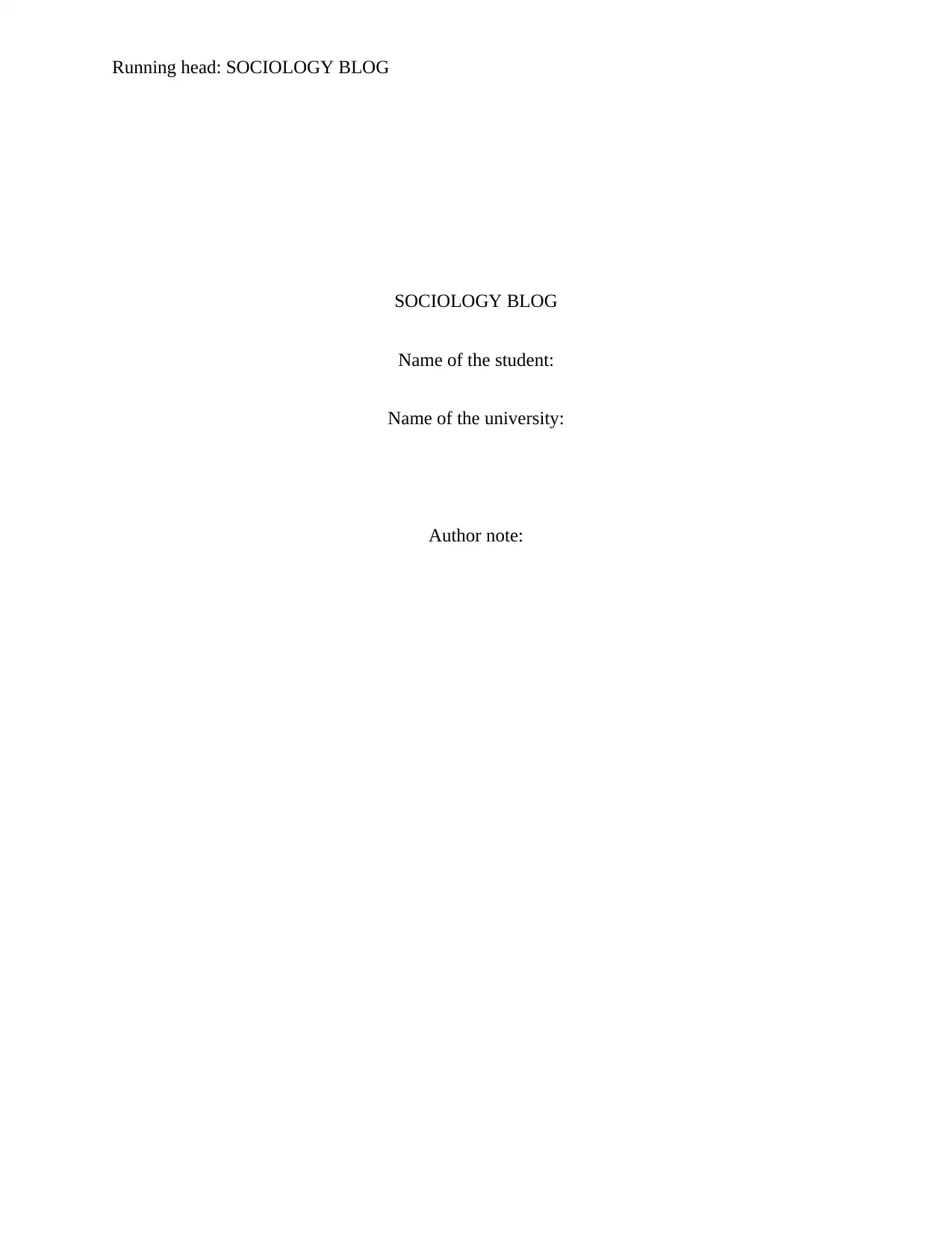
Running head: SOCIOLOGY BLOG
SOCIOLOGY BLOG
Name of the student:
Name of the university:
Author note:
SOCIOLOGY BLOG
Name of the student:
Name of the university:
Author note:
Paraphrase This Document
Need a fresh take? Get an instant paraphrase of this document with our AI Paraphraser
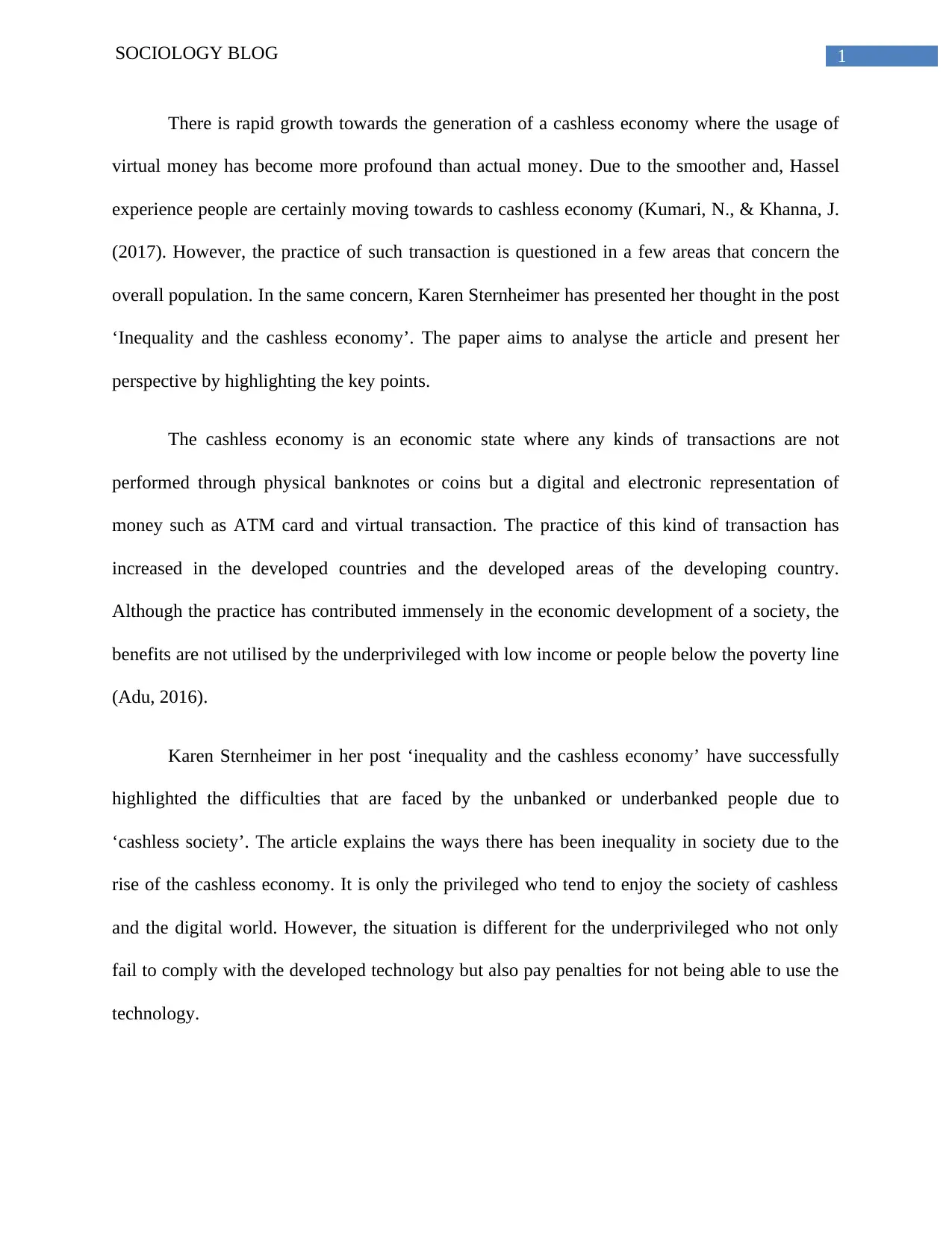
1SOCIOLOGY BLOG
There is rapid growth towards the generation of a cashless economy where the usage of
virtual money has become more profound than actual money. Due to the smoother and, Hassel
experience people are certainly moving towards to cashless economy (Kumari, N., & Khanna, J.
(2017). However, the practice of such transaction is questioned in a few areas that concern the
overall population. In the same concern, Karen Sternheimer has presented her thought in the post
‘Inequality and the cashless economy’. The paper aims to analyse the article and present her
perspective by highlighting the key points.
The cashless economy is an economic state where any kinds of transactions are not
performed through physical banknotes or coins but a digital and electronic representation of
money such as ATM card and virtual transaction. The practice of this kind of transaction has
increased in the developed countries and the developed areas of the developing country.
Although the practice has contributed immensely in the economic development of a society, the
benefits are not utilised by the underprivileged with low income or people below the poverty line
(Adu, 2016).
Karen Sternheimer in her post ‘inequality and the cashless economy’ have successfully
highlighted the difficulties that are faced by the unbanked or underbanked people due to
‘cashless society’. The article explains the ways there has been inequality in society due to the
rise of the cashless economy. It is only the privileged who tend to enjoy the society of cashless
and the digital world. However, the situation is different for the underprivileged who not only
fail to comply with the developed technology but also pay penalties for not being able to use the
technology.
There is rapid growth towards the generation of a cashless economy where the usage of
virtual money has become more profound than actual money. Due to the smoother and, Hassel
experience people are certainly moving towards to cashless economy (Kumari, N., & Khanna, J.
(2017). However, the practice of such transaction is questioned in a few areas that concern the
overall population. In the same concern, Karen Sternheimer has presented her thought in the post
‘Inequality and the cashless economy’. The paper aims to analyse the article and present her
perspective by highlighting the key points.
The cashless economy is an economic state where any kinds of transactions are not
performed through physical banknotes or coins but a digital and electronic representation of
money such as ATM card and virtual transaction. The practice of this kind of transaction has
increased in the developed countries and the developed areas of the developing country.
Although the practice has contributed immensely in the economic development of a society, the
benefits are not utilised by the underprivileged with low income or people below the poverty line
(Adu, 2016).
Karen Sternheimer in her post ‘inequality and the cashless economy’ have successfully
highlighted the difficulties that are faced by the unbanked or underbanked people due to
‘cashless society’. The article explains the ways there has been inequality in society due to the
rise of the cashless economy. It is only the privileged who tend to enjoy the society of cashless
and the digital world. However, the situation is different for the underprivileged who not only
fail to comply with the developed technology but also pay penalties for not being able to use the
technology.
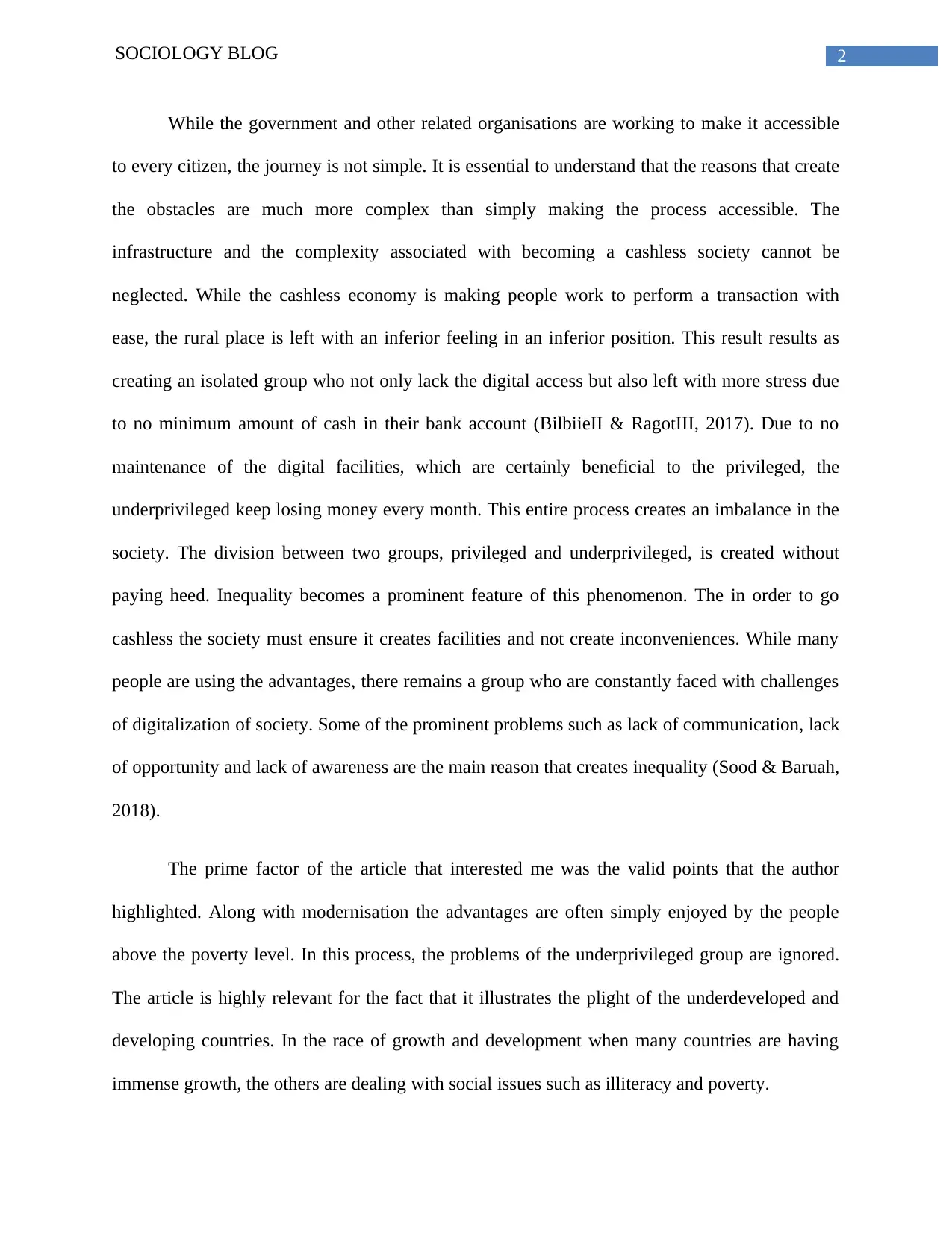
2SOCIOLOGY BLOG
While the government and other related organisations are working to make it accessible
to every citizen, the journey is not simple. It is essential to understand that the reasons that create
the obstacles are much more complex than simply making the process accessible. The
infrastructure and the complexity associated with becoming a cashless society cannot be
neglected. While the cashless economy is making people work to perform a transaction with
ease, the rural place is left with an inferior feeling in an inferior position. This result results as
creating an isolated group who not only lack the digital access but also left with more stress due
to no minimum amount of cash in their bank account (BilbiieII & RagotIII, 2017). Due to no
maintenance of the digital facilities, which are certainly beneficial to the privileged, the
underprivileged keep losing money every month. This entire process creates an imbalance in the
society. The division between two groups, privileged and underprivileged, is created without
paying heed. Inequality becomes a prominent feature of this phenomenon. The in order to go
cashless the society must ensure it creates facilities and not create inconveniences. While many
people are using the advantages, there remains a group who are constantly faced with challenges
of digitalization of society. Some of the prominent problems such as lack of communication, lack
of opportunity and lack of awareness are the main reason that creates inequality (Sood & Baruah,
2018).
The prime factor of the article that interested me was the valid points that the author
highlighted. Along with modernisation the advantages are often simply enjoyed by the people
above the poverty level. In this process, the problems of the underprivileged group are ignored.
The article is highly relevant for the fact that it illustrates the plight of the underdeveloped and
developing countries. In the race of growth and development when many countries are having
immense growth, the others are dealing with social issues such as illiteracy and poverty.
While the government and other related organisations are working to make it accessible
to every citizen, the journey is not simple. It is essential to understand that the reasons that create
the obstacles are much more complex than simply making the process accessible. The
infrastructure and the complexity associated with becoming a cashless society cannot be
neglected. While the cashless economy is making people work to perform a transaction with
ease, the rural place is left with an inferior feeling in an inferior position. This result results as
creating an isolated group who not only lack the digital access but also left with more stress due
to no minimum amount of cash in their bank account (BilbiieII & RagotIII, 2017). Due to no
maintenance of the digital facilities, which are certainly beneficial to the privileged, the
underprivileged keep losing money every month. This entire process creates an imbalance in the
society. The division between two groups, privileged and underprivileged, is created without
paying heed. Inequality becomes a prominent feature of this phenomenon. The in order to go
cashless the society must ensure it creates facilities and not create inconveniences. While many
people are using the advantages, there remains a group who are constantly faced with challenges
of digitalization of society. Some of the prominent problems such as lack of communication, lack
of opportunity and lack of awareness are the main reason that creates inequality (Sood & Baruah,
2018).
The prime factor of the article that interested me was the valid points that the author
highlighted. Along with modernisation the advantages are often simply enjoyed by the people
above the poverty level. In this process, the problems of the underprivileged group are ignored.
The article is highly relevant for the fact that it illustrates the plight of the underdeveloped and
developing countries. In the race of growth and development when many countries are having
immense growth, the others are dealing with social issues such as illiteracy and poverty.
⊘ This is a preview!⊘
Do you want full access?
Subscribe today to unlock all pages.

Trusted by 1+ million students worldwide
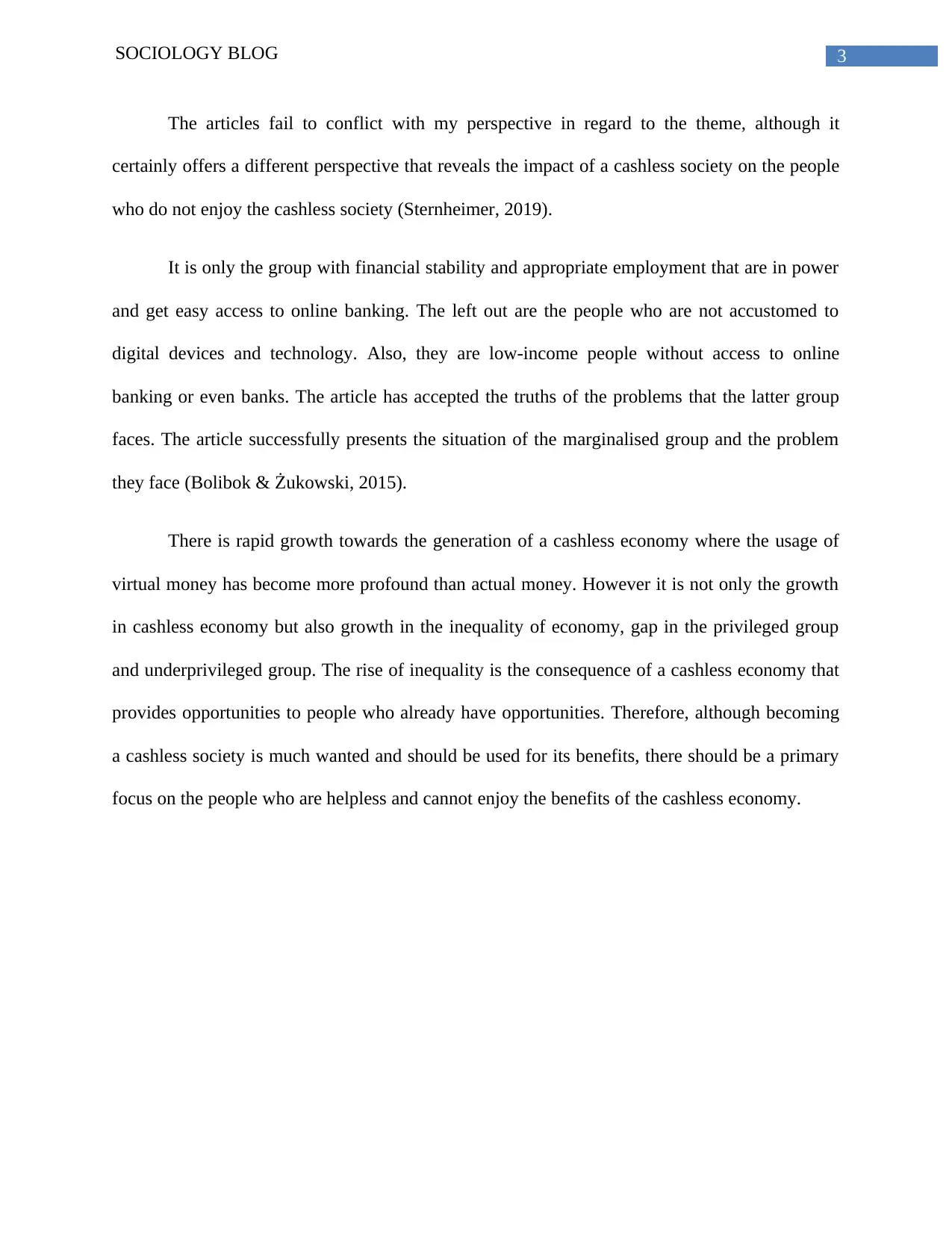
3SOCIOLOGY BLOG
The articles fail to conflict with my perspective in regard to the theme, although it
certainly offers a different perspective that reveals the impact of a cashless society on the people
who do not enjoy the cashless society (Sternheimer, 2019).
It is only the group with financial stability and appropriate employment that are in power
and get easy access to online banking. The left out are the people who are not accustomed to
digital devices and technology. Also, they are low-income people without access to online
banking or even banks. The article has accepted the truths of the problems that the latter group
faces. The article successfully presents the situation of the marginalised group and the problem
they face (Bolibok & Żukowski, 2015).
There is rapid growth towards the generation of a cashless economy where the usage of
virtual money has become more profound than actual money. However it is not only the growth
in cashless economy but also growth in the inequality of economy, gap in the privileged group
and underprivileged group. The rise of inequality is the consequence of a cashless economy that
provides opportunities to people who already have opportunities. Therefore, although becoming
a cashless society is much wanted and should be used for its benefits, there should be a primary
focus on the people who are helpless and cannot enjoy the benefits of the cashless economy.
The articles fail to conflict with my perspective in regard to the theme, although it
certainly offers a different perspective that reveals the impact of a cashless society on the people
who do not enjoy the cashless society (Sternheimer, 2019).
It is only the group with financial stability and appropriate employment that are in power
and get easy access to online banking. The left out are the people who are not accustomed to
digital devices and technology. Also, they are low-income people without access to online
banking or even banks. The article has accepted the truths of the problems that the latter group
faces. The article successfully presents the situation of the marginalised group and the problem
they face (Bolibok & Żukowski, 2015).
There is rapid growth towards the generation of a cashless economy where the usage of
virtual money has become more profound than actual money. However it is not only the growth
in cashless economy but also growth in the inequality of economy, gap in the privileged group
and underprivileged group. The rise of inequality is the consequence of a cashless economy that
provides opportunities to people who already have opportunities. Therefore, although becoming
a cashless society is much wanted and should be used for its benefits, there should be a primary
focus on the people who are helpless and cannot enjoy the benefits of the cashless economy.
Paraphrase This Document
Need a fresh take? Get an instant paraphrase of this document with our AI Paraphraser
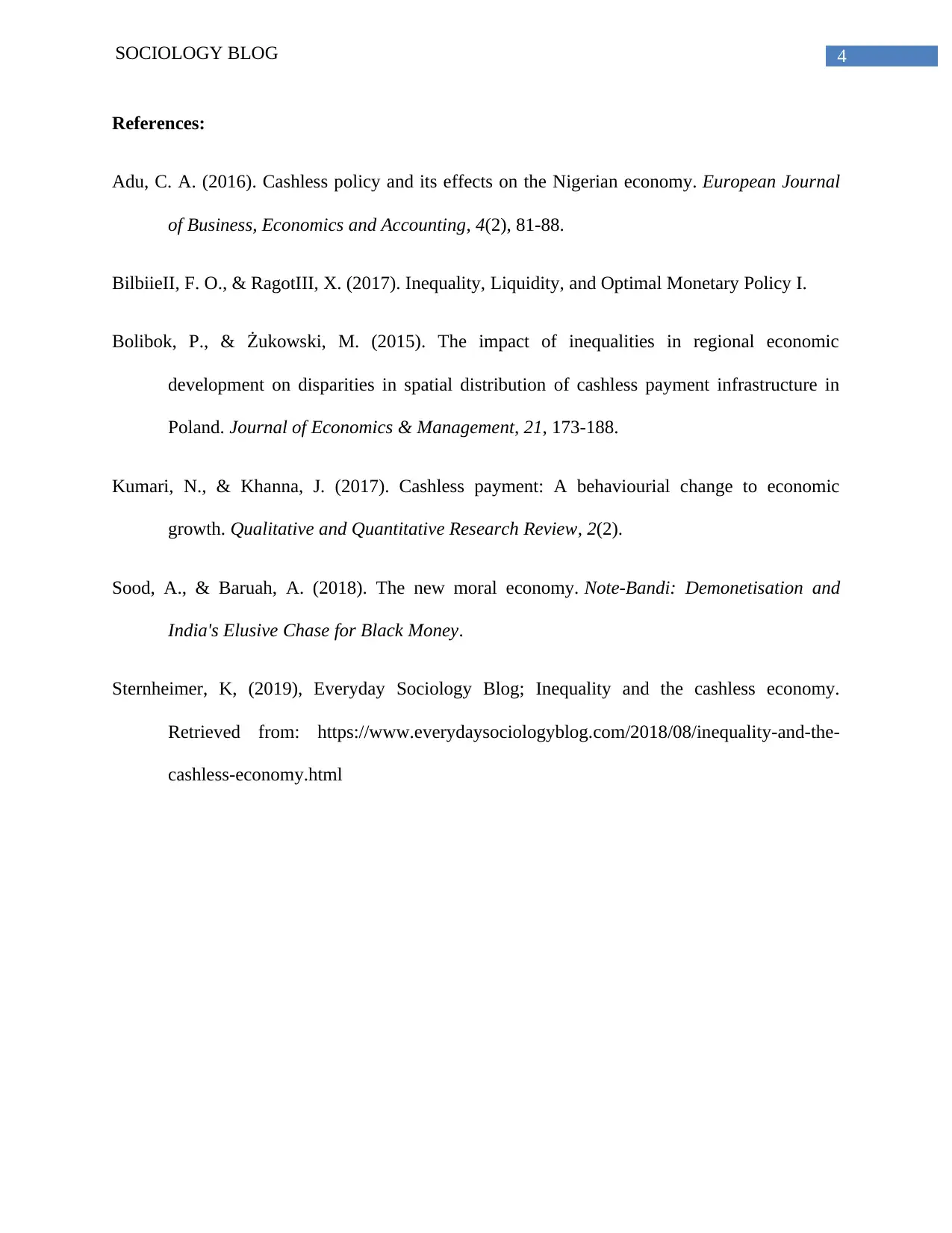
4SOCIOLOGY BLOG
References:
Adu, C. A. (2016). Cashless policy and its effects on the Nigerian economy. European Journal
of Business, Economics and Accounting, 4(2), 81-88.
BilbiieII, F. O., & RagotIII, X. (2017). Inequality, Liquidity, and Optimal Monetary Policy I.
Bolibok, P., & Żukowski, M. (2015). The impact of inequalities in regional economic
development on disparities in spatial distribution of cashless payment infrastructure in
Poland. Journal of Economics & Management, 21, 173-188.
Kumari, N., & Khanna, J. (2017). Cashless payment: A behaviourial change to economic
growth. Qualitative and Quantitative Research Review, 2(2).
Sood, A., & Baruah, A. (2018). The new moral economy. Note-Bandi: Demonetisation and
India's Elusive Chase for Black Money.
Sternheimer, K, (2019), Everyday Sociology Blog; Inequality and the cashless economy.
Retrieved from: https://www.everydaysociologyblog.com/2018/08/inequality-and-the-
cashless-economy.html
References:
Adu, C. A. (2016). Cashless policy and its effects on the Nigerian economy. European Journal
of Business, Economics and Accounting, 4(2), 81-88.
BilbiieII, F. O., & RagotIII, X. (2017). Inequality, Liquidity, and Optimal Monetary Policy I.
Bolibok, P., & Żukowski, M. (2015). The impact of inequalities in regional economic
development on disparities in spatial distribution of cashless payment infrastructure in
Poland. Journal of Economics & Management, 21, 173-188.
Kumari, N., & Khanna, J. (2017). Cashless payment: A behaviourial change to economic
growth. Qualitative and Quantitative Research Review, 2(2).
Sood, A., & Baruah, A. (2018). The new moral economy. Note-Bandi: Demonetisation and
India's Elusive Chase for Black Money.
Sternheimer, K, (2019), Everyday Sociology Blog; Inequality and the cashless economy.
Retrieved from: https://www.everydaysociologyblog.com/2018/08/inequality-and-the-
cashless-economy.html
1 out of 5
Your All-in-One AI-Powered Toolkit for Academic Success.
+13062052269
info@desklib.com
Available 24*7 on WhatsApp / Email
![[object Object]](/_next/static/media/star-bottom.7253800d.svg)
Unlock your academic potential
Copyright © 2020–2026 A2Z Services. All Rights Reserved. Developed and managed by ZUCOL.
